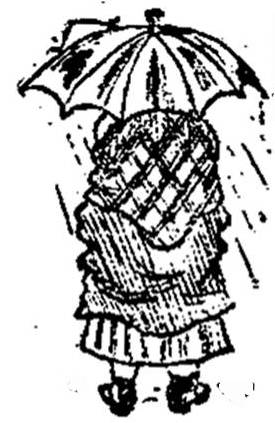This article has been transcribed from a copy of the Cardiff Times in the online collection of scanned Welsh newspapers 1804-1919 in the National Library of Wales, with grateful recognition of the free access accorded to all readers. Paragraph breaks have been introduced for easier reading.
The summer of 1888 had been one of the coldest in the late nineteenth century, and Samuel now describes what used to be typical November weather, before the Clean Air Acts of 1956, 1968 and 1970 limited the amount of smoke contaminating the air. The meanings of ‘spit-devils’, ‘rippers’ and ‘mill-band’ have not been found. The William Tell trick is shooting an arrow through an apple on one’s son’s head, while ‘his Uncle, the Pawnee Chief’ is the pawnbroker. The tedious literary lecturer holds forth on Robert Browning because the vogue for the poet had produced large numbers of Browning Societies in Britain and America. ‘Parkin’ is a kind of gingerbread made from oatmeal and treacle, and the owners of Farnley Hall in North Yorkshire were distantly related to Guy Fawkes. —David Skilton

‘Hi, come on lads let’s go a chumping. There’s lots of cloathes props throwin’ abaht.’
ORRORS! November round again, of course; coming round again is one of it’s [sic] habits, sir, isn't it? Well, after all, be November what it may, it isn't a nasty deceitful impostor, like some of the so-called ‘summer’ (ugh, how I shiver) months, those awful old frauds. We all know what to expect in November – and we usually get it. There was an impression abroad at one time that November was the month for suicides, but it has since been conclusively proved by statisticians (what can they not prove?) that this is not [sic] erroneous. Our English June and July induce far more people to commit suicide than does November – and no wonder. Of course there are a lot of people who commit the act of self-slaughter in November – generally by going in for amateur pyrotechny, and the number of heads of hair that are singed and fingers and noses that are blown off is something to make the heart of an enthusiastic surgeon leap joyously. What a savage sort of satisfaction Master Guy Fawkes, ‘the king of sinisters,’ must feel when he reflects that although he did not succeed in blowing up ‘the House of Lords, the King, and all his Ministers,’ he has at least been the great prime cause of thousands of persons who have celebrated his downfall being most considerably shatter[r]ed. And he must further rejoice hugely when he remembers what a huge quantity of valuable property has been destroyed, and what an infinity of timid people have been put to grievous inconvenience through the celebrating of the Fifth of November, that fruitful season for aspiring coroners.

All that you can see of your neighbours in the theatre lobby tis weather.
Of course, sir, I don't suppose for a moment that any one nowadays cares two straws about the historical significance of the celebration of the fifth, but that day affords a fruitful opportunity for quite a host of people to kill and maim themselves, so of course it is still highly popular. And then again it confers upon charitable people the privilege of holding an enemy up to ridicule and contempt by bribing a parcel of mischievous imps to burn the said enemy in effigy, the said effigy being most artistically constructed out of straw, a very old suit of clothes, and a penny mask. ln effigy-making, I may remark, it is in the highest degree necessary that a pipe should be stuck in its mouth, and that its feet should always dangle down with the toes where the heels ought to be. I may say here, sir, that I am an authority in these matters. I was in boyhood quite a proficient at the art of making ‘spit-devils’ and ‘rippers,’ and I passed through quite a fiery ordeal in the way of handling pistols warranted to burst, cannons guaranteed to spring in the air whenever they were exploded, and rockets that, instead of mounting skyward, invariably ‘sputtered’ violently off in the direction of a crowd, greatly to the consternation of the latter. I have burnt my youthful garments by putting lighted mill-band in my pockets. I have nearly blown the front kitchen up by using the same as a fire work manufactory, and by endeavouring to mix, with a pestle, saltpetre and gunpowder in a mortar; I have opened the hall doors of respectable gentlemen and have cast into the lobbies monstrous crackers, and I have felt the corrective effects of a strap as a consequence. I have nearly blown a youthful companion bald-headed by endeavouring to do the William Tell trick with him, and I have even gone so far as to eat the compound called ‘parkin’— therefore do I consider myself well entitled to speak as to the Guy Fawkes' aspect of November. If any further proof be required I may mention that I have found articles of fuel that had never been lost in order to provide fit material for the usual ‘bonfire;’ I have, in fact, appropriated all the hingeless garden gates, all the clothes props, all the miscellaneous woodwork I could find lying around, and I have, quite without invitation, visited the unprotected coal cellars of all the neighbours available. I have done much to perpetuate the name and fame of Fawkes, so if his honoured descendant out Farnley way likes to send me a grand piano, a cheque for fifty pounds, or some trifle of the sort, I shall certainly accept it and duly acknowledge it in these columns.

‘Well this his weather: and no mistake. Not heven a first class humbrella like this can portect one.’
November, sir, is famous as the season when all the penny-readings young men, the amateur vocalism fiends, the scientific lecture bores, and the magic lantern nuisances emerge from their well-earned obscurity. Not even the fogs, sir, can silence the voiceful men amongst these classes. The only man amongst them who seems to get be-fogged is the magic lantern merchant, who frequently puts his slides in wrong way up, or has a big gas explosion, or (this occurs oftener still) leaves the room wherein he is performing in total darkness – a state of darkness that is not too severely censured by the younger people of the audience who may be supposed to have a penchant for each other. The advent of these ‘entertainers,’ sir, is one of the horrors which have given so bad a name to the month of November. Trust me, sir, the ‘literary’ lecturer who gets up and spouts for three hours at a stretch about Browning,[i] say, and reads (after sucking a voice jujube or two) selections from his work, does nothing whatever to mitigate the miseries of a drizzly November night.

One of the favourite victims of the firework fiend.
November, my guileless editor, is that season of the year when the impecunious man struggling against difficulties begins to think that it is about time he went and requested his Uncle, the Pawnee Chief, to return that overcoat which was left with him (the Chief) about April, and which has been carefully put away and ticketed ever since. One advantage such a man, sir, enjoys during foggy November, if he has been lucky enough to get into debt, is that in the prevalent murkiness of the atmosphere he is little likely to be seen coming round the corner by his creditors or by the myrmidons of the law. To such a man, you see, even fog has its merits. That awkward customer who has his touch of winter cough, and who barks unremittingly in church, and in the omnibus, and in the I tram, and makes one reflect upon such cheering things as graveyards, comes into season in November, and the enterprising British tradesman ‘sells off’ old stock at a most ‘fearful sacrifice’ – and looks remarkably jolly all the time. And in November the coal merchant begins to smile as though he had just heard of the death of a rich relation, and he even goes so far as to promise his wife a new ‘rig out.’
And the average man, sir, begins to assert that, after all, beer as a beverage does not suit him as well as ‘Scotch, hot, with a bit of lemon, please,’ and the drowsy servant girl who has to get up and light the fire cherishes an opinion that life is scarcely, sir, all things considered, worth living. I'm not sure whether she isn't right so far as the average November goes.
Last modified 19 February 2022